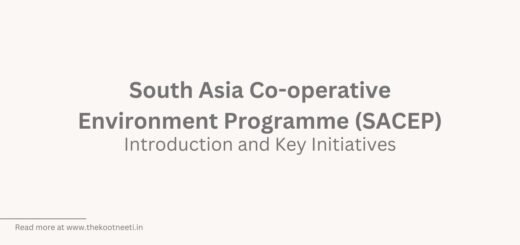World Trade Organisation (WTO): Introduction, Objectives, Functions and Achievements

The World Trade Organization (WTO) is a global organization that deals with the rules of trade between nations. Its main function is to ensure that trade flows smoothly, predictably and freely as possible. The WTO was created in 1995 to replace the General Agreement on Tariffs and Trade (GATT), which had been in place since 1948. It is headquartered in Geneva, Switzerland. The WTO’s main functions include:
- Administering WTO trade agreements
- Providing a forum for trade negotiations
- Monitoring national trade policies
- Providing technical assistance and training for developing countries
- Cooperating with other international organizations
The World Trade Organization (WTO) has several objectives, which are outlined in the WTO agreements. These objectives include:
- To increase international trade: The WTO aims to increase international trade by reducing barriers to trade, such as tariffs and other trade barriers.
- To provide a forum for trade negotiations: The WTO provides a forum for countries to negotiate trade agreements and resolve trade disputes peacefully.
- To promote trade liberalization: The WTO encourages countries to liberalize their trade policies and reduce barriers to trade, which can lead to increased competition and efficiency in the global economy.
- To provide predictability and stability: The WTO helps to create predictability and stability in the global economy by establishing a framework for international trade and investment.
- To protect the rights of WTO members: The WTO seeks to protect the rights of its member countries and ensure that they are treated fairly in international trade.
- To help developing countries: The WTO works to help developing countries participate in the global economy by providing technical assistance and other forms of support.
The WTO has 164 member countries, which represent more than 97% of global trade. The organization’s decisions are made by the member countries, and all members have an equal say in the decision-making process. The WTO’s main decision-making body is the Ministerial Conference, which meets every two years.
Some of the achievements of the WTO include:
- Facilitating trade: The WTO helps to remove barriers to trade, such as tariffs and other trade barriers, which makes it easier for countries to buy and sell goods and services.
- Promoting economic development: By increasing trade and investment, the WTO helps to stimulate economic growth and development, particularly in developing countries.
- Providing predictability and stability: The WTO provides a framework for international trade that helps to create predictability and stability, which allows businesses to plan and invest with confidence.
- Enhancing transparency: The WTO promotes transparency in international trade by publishing trade statistics and making information about trade policies and practices available to the public.
- Providing a forum for dispute resolution: The WTO provides a forum for countries to resolve trade disputes peacefully and through negotiation, rather than resorting to measures such as trade sanctions.
- Promoting liberalization: The WTO encourages countries to liberalize their trade policies, which can lead to increased competition and efficiency in the global economy.
India and the WTO
India is a founding member of the World Trade Organization (WTO) and has been an active participant in the organization since it was established in 1995. As a member of the WTO, India has made a number of commitments to reduce tariffs and other barriers to trade, and to provide predictable and transparent trade policies.
India has benefited from WTO membership in several ways. For example, the WTO’s rules have helped to open up markets for Indian exports, and the organization’s dispute settlement mechanism has provided a forum for resolving trade disputes with other countries. At the same time, India has also had to make some concessions, such as reducing tariffs on certain imported goods.
India has been an active participant in WTO negotiations and has played a key role in shaping the organization’s agenda on issues such as agriculture, intellectual property and development. The country has also made use of the WTO’s dispute settlement mechanism to address trade disputes with other countries.
India’s membership in the WTO has helped to support the country’s economic growth and development.


















